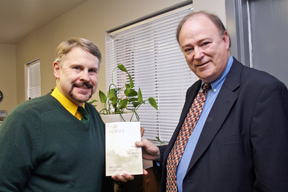A new book by two UAB communication studies professors examines one of the Bible’s most controversial stories, in Genesis 22:1-14, when Abraham, in obedience to the voice of God, places his son, Isaac, on an altar for sacrifice.
 |
| UAB professors Larry Powell and William Self explore the rhetoric of sacrifice in their new book Holy Murder. |
“The story of the sacrifice of Isaac has, for 3,000 years, impacted the three great religions – Christianity, Judaism and Islam – and each religion has interpreted the story differently,” says UAB Professor Larry Powell, Ph.D. “Even among adherents of a common faith, the interpretations have differed so widely that the story has been used to justify acts such as infanticide, mass murders and even suicide bombings.”
The book Holy Murder: Abraham, Isaac, and the Rhetoric of Sacrifice, by Powell and Associate Professor William Self, Ph.D., is written for scholars and students. The book, published by United Press of America Inc., explores the rhetoric of sacrifice and how the sacrifice of Isaac has been interpreted by individuals and by the Jewish, Christian and Islamic faiths.
In Judaism the story is known as the “akedah,” or the binding of Isaac, in which God commands Abraham to sacrifice his son as a test of Abraham’s faith. In Christianity the story is an example of faith and foreshadows Christ’s sacrifice for mankind. In Islam the story is about supreme obedience. In this version, Isaac actively submits to being sacrificed. In all three versions, however, the story ends with God intervening and preventing Abraham from actually killing Isaac.
In their book, Powell and Self discuss the moral questions that the “akedah” has evoked through the centuries, such as whether Abraham would have actually killed his son and whether the kind of obedience Abraham displayed was justified. The authors also highlight recent case studies to demonstrate how elements of the “akedah” have been used to inspire acts of martyrdom and self-sacrifice.
In addition, Holy Murder showcases infamous examples of when people have used the rhetoric of sacrifice to inspire others to kill or to kill themselves for a greater cause. Such examples include the 1978 mass murder of more than 900 people in Guyana under the inspiration of cult leader Jim Jones and the shooting of abortion clinic doctors by those claiming to be followers of the right-to-life movement. Most recently, following the Sept. 11 terrorist attacks, Osama bin Laden maintained that he would prevail over Americans because his followers were more willing to sacrifice their lives than were Americans, the authors write.
Powell says the story of Abraham and Isaac has fascinated him since he was a teenager. “I grew up in a conservative, religious background, says Powell. “As a teenager, I became fascinated with the one passage in the Bible in which the pastor did not follow his literal interpretation. I became intrigued by the passage in that it would get someone like him to abandon one of his basic principles, which was a literal interpretation of the Bible.”
Years later, Powell says he was reminded of the scripture after reading stories in the news about mothers killing their children and about honor killings in the Middle East and the United States in which males kill female relatives for dishonoring the family.
Holy Murder makes no attempt to resolve disagreements over the interpretation of the “akedah,” the authors write.
"I hope the book, however, will encourage readers to be less gullible,” says Powell, “and to be suspicious of those who use religious arguments to get others to commit non-religious acts.”